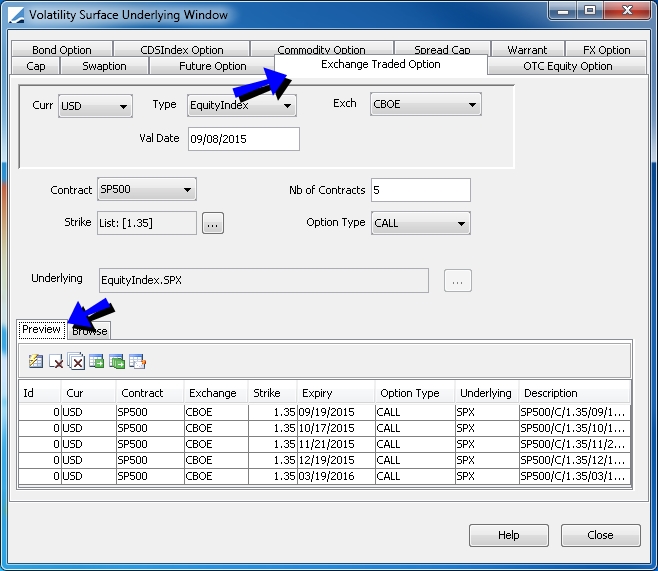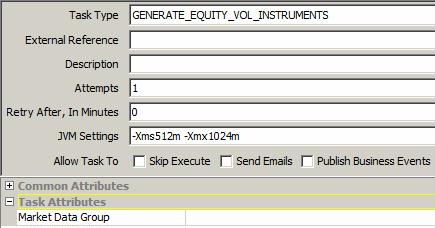Exchange Traded Option - Vol Surface Underlying
The Equity ETO underlying can be used in construction of the EQUITY volatility surface.
Exchange Traded Option Configuration
| • | Create the ETO contracts using Configuration > Listed Derivatives > Options Contracts from the Calypso Navigator. |
1. Exchange Traded Option Volatility Surface Underlying
Create the underlying instruments in the Volatility Surface Underlying Window, Exchange Traded Option panel.
You can select the Browse tab to load existing underlying instruments.
Otherwise, select the Preview tab to create new underlying instruments.

| » | Complete the details as described in the table below. |
| » | Click  to generate the underlying instruments. to generate the underlying instruments. |
| » | Then select rows and click  to save the selected rows, or click to save the selected rows, or click  to save all rows. to save all rows. |
| » | Click  to save the quote names. to save the quote names. |
The system creates quotes like in the following example: "ETOEquityIndex.SPX.SP500.C.1.35.APR.14", type = Price
Fields Details
| Fields | Description |
|---|---|
|
Curr |
Select the currency of the underlying. |
|
Type |
Select the type of ETO (Commodity, FX, Equity, Equity Index). |
|
Exch |
Select the exchange where the contract is listed. The application then loads the available contracts. |
|
Val Date |
Valuation date. It defaults to the current date. |
|
Contract |
Select the ETO contract. The application automatically displays the corresponding underlying products. |
| Nb of contracts | Enter the number of products traded in the contract. |
|
Strike |
Click ... to set a list of strikes. |
|
Option Type |
Select the option type: CALL, PUT, or BOTH. |
|
Underlying |
Displays the underlying product of the selected contract. |
2. Automatic Creation of Underlying Instruments
The scheduled task GENERATE_EQUITY_VOL_INSTRUMENTS creates underlying instruments as of the scheduled task value date. The scheduled task also creates the corresponding Quote Names in the Quote Set.

The scheduled task uses the information of the ETO contract (Expiration date rule, Number of. Contracts) and of the Volatility Surface Underlying window (Strikes) to create the missing ETO underlying instruments. It creates all underlying instruments with Strikes and Expiries that do not exist yet in the database. The number of Expiries (per Strike) is limited to the value of the field “No. Contracts”, with respect to the Value Date of the scheduled task.